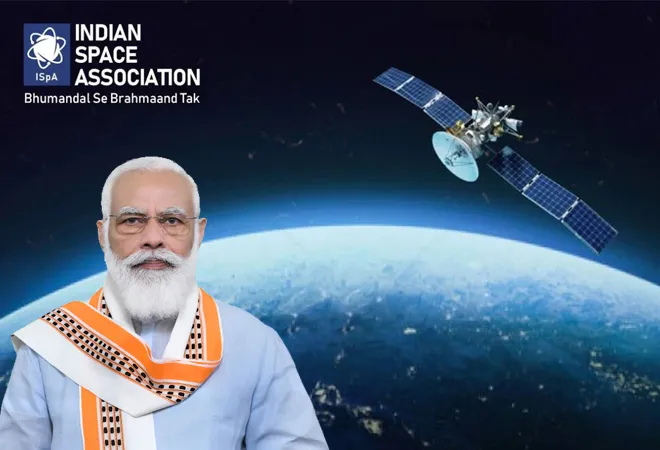
On the 11th of October, 2021, Prime Minister Shri Narendra Modi launched the Indian Space Association (ISpA) in New Delhi, which will be aimed towards bringing in critical technology and investment into the country alongside formulation of policy framework that will fulfil Mr. Modi’s vision of making India a global leader in the space arena. During the event the Hon’ble Prime Minister stated that “For 75 years since independence, Indian space has been dominated by a single umbrella of Indian government and government institutions. Scientists of India have made huge achievements in these decades, but the need of the hour is that there should be no restrictions on Indian talent, whether it is in the public sector or in the private sector.”
This is just the latest step in the Modi government’s push towards expansion of the role of private players in the space industry. This push towards a more liberalised space sector has been on the agenda of the current government for quiet some time, and with good reason. In spite of having one of the most successful and cost-effective space programmes in the world, India accounts for only 2 percent of the global space economy. The two key reasons for the same are lack of space specific laws and effective monopoly enjoyed by ISRO over all space-related activities.
Scientists of India have made huge achievements in these decades, but the need of the hour is that there should be no restrictions on Indian talent, whether it is in the public sector or in the private sector.
India’s current space activities are currently governed by a few international treaties along with two national polices which are Satellite Communication Policy (SATCOM) and Remote Sensing Data Policy (RSDP). SATCOM policy was introduced in 1997 and is aimed at developing the space and satellite communications industry within India. In 2000, the Government of India (GOI) introduced norms for the implementation of the 1997 policy. The RSDP was introduced in 2001 by the GOI and revised in 2011. It lays down clear guidelines for the distribution of satellite remote sensing data within India and states that the GOI is the exclusive owner of all data received from Indian Remote Sensing Satellites (IRS) to which private entities can only acquire a license through the nodal agency.
Up until recently, the need for a domestic space law was not felt as space was seen more of an international issue rather than a domestic one. Furthermore, the private sector has only recently shown willingness to invest and play a bigger role in India’s space sector after realising the potential of commercial space activity. ISRO’s recent string of bold and successful missions such as 2019’s Chandrayaan-2 and 2014’s Mission Mangalyaan has further spiked the private sector’s interest in the domestic space economy.
Space Activities Bill
The Modi government from its very inception in 2014 has shown interest in reforming the domestic space sector and enlarging private sector’s role in it. In 2017, ISRO introduced the Space Activities Bill which was aimed at promoting and regulating private sector’s role in the Indian space sector.
The 2017 draft bill lays down a basic legal framework which provides for creation of a regulatory mechanism by the GOI and confers a wide array of regulatory and rulemaking powers on it to discharge its duties. It also defines the persons and objects which would fall within the purview of the domestic space law and mandates that the GOI will form a Space Activity Regulatory Mechanism to “develop a space activity plan with established goals, tasks and principles including the comprehensive development of space sector and ground segments of space infrastructure and technologies for commercial and economic needs of the country.”
If and when the bill is passed, private parties will be able to launch rockets and conduct commercial space activities with the authorisation and supervision of the government.
The most important feature of the draft is one that lays down the mechanism for granting of license and regulation of private entities for commercial space activities as per any international treaty India is a signatory to. It directs the GOI to “arrange to provide authorisation to launch or operate commercial space activity including corporate and other organisational structure either directly or through any agency in the manner as may be prescribed.” This means that if and when the bill is passed, private parties will be able to launch rockets and conduct commercial space activities with the authorisation and supervision of the government. The draft also contains provisions for risk-sharing mechanism by which the GOI may determine the quantum of liability borne by the license due to damaged cause by its space activity.
Since commercial space activities by nature are high-risk and high-investment ventures, a clear domestic space bill will encourage investment into the industry, which is the main goal of the draft bill. Additionally, the draft also discharges India’s responsibility and international obligations by enacting a domestic legislative mechanism. Currently, as stated by one of the cabinet ministers of GOI, the bill is “under consideration” and has yet to be presented before the Parliament.
Although the intent behind the bill is laudable, some provisions of the same are problematic. One clause of the same lays down that “No suit, prosecution or other legal proceedings shall lie against the Central Government in respect of anything done in good faith in pursuance of any space activity under this bill.” This clause violates a very basic feature of the constitution of India, and therefore, creates a doubt about the very legality of it, namely, judicial review. Also, the bill takes a heavy-handed regulatory approach by way of subjecting parties to numerous terms and conditions, giving binding directions, mandatory enquiry into the affairs of parties and extensive system of licensing. If the final draft which may be presented by the government in the near future is not rid of such provisions, the very purpose of the very bill might be negated.
ISRO has also come up with a National Space Transportation Policy (NSTP) in 2020, which provides hand-holding, promotion, and guidance of private enterprises through the regulatory requirement. The NSTP authorises private entities to establish and operate rocket launch sites both within and outside India, with authorisation from Indian National Space Promotion and Authorisation Centre (IN-SPACe). Finally, the policy further mandates ISRO to focus its research and development on greener space technology such as green fuels and reusable rockets. In line with the GOI’s agenda of promotion of private enterprises in space sector, the policy assures that IN-SPACe shall provide them with a level playing field.
The GOI has supplemented the ongoing space focused polices by creation of the (IN-SPACe) and NewSpace India Limited (NSIL). IN-SPACe is an independent organisation under the DOS created for the sole purpose of encouraging, promoting, and handholding the private sector through the complexities of space economy. As stated above, IN-SPACe will also act as the nodal authority for any orbital launch by any private entity from within or outside India as well as usage of any DOS owned facilities by Non-Government Private Enterprises (NGPE).
In line with the GOI’s agenda of promotion of private enterprises in space sector, the policy assures that IN-SPACe shall provide them with a level playing field.
NSIL, on the other hand, is a public sector company which is wholly owned by the GOI. It will serve as the marketing arm of ISRO, which means that it will market the technologies developed by ISRO to private clients. Both these organisations will help NGPEs in establishing themselves with the help of infrastructure and technological know-how of ISRO.
Conclusion
The Modi government’s agenda to open the space sector to wider private participation is just about in time. Merrill Lynch, a division of the Bank of America has estimated that space economy will be worth US $5 trillion by 2050. The benefits of opening up the space sector to NGPEs can be clearly seen from the world leader in space technology, the USA. Elon Musk’s SpaceX, which has been recently valued at momentous US $100 billion. Morgan Stanley estimates that the US $350-billion global space industry will expand up to US $1 trillion by 2040. Activities such as asteroid mining, Earth observation, space tourism, satellite launches, deep space exploration, and satellite internet will be the drivers of the new space economy.
The steps taken in pursuit of the same are constructive and have garnered much praise from the private community. The formation of ISpA and the inclusion of homegrown and global corporations such as Bharti Airtel, Larson & Turbo, and Nelco (TATA Group), amongst others is a clear example of the Modi regime’s thrust towards opening up India’s space economy for commercial utilisation under the supervision of nodal authorities. With its mixture of cost-effective technology, budding start-up culture, abundance of youth, technological know-how, and with ISRO already acting as a springboard, India has the potential to become a world leader in the global space economy. The Modi government need only be careful while framing the domestic space law as it has the potential to change India’s future for better or for worse.
The views expressed above belong to the author(s). ORF research and analyses now available on Telegram! Click here to access our curated content — blogs, longforms and interviews.




 PREV
PREV


